The HyperTexts
Ratzinger's Children: Pope Benedict XVI, the Roman Catholic Church, and a
Culture of Child Abuse and Hell
by Michael R. Burch, an editor and publisher of
Holocaust and Nakba poetry
Pope Benedict XVI, nee Cardinal Joseph Ratzinger, is tremendously concerned
about the dignity and authority of the Roman Catholic Church ... but does he
care about all the children who will die harrowing deaths from AIDS and other
diseases because he told them that using condoms is a "sin"? Isn't that
child abuse and murder?
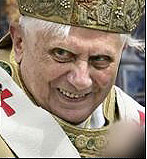
Does he truly care about the innocent, trusting children who sit in his
church's pews? Or does he only care about his church's Money
and Power? Can a true religion care more about money
and power than innocent children? Did Jesus Christ care more about money and
power than children's lives, health and happiness?
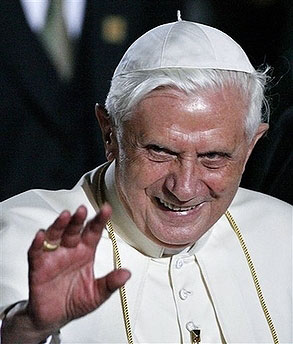
Suffer the little children to come unto me!
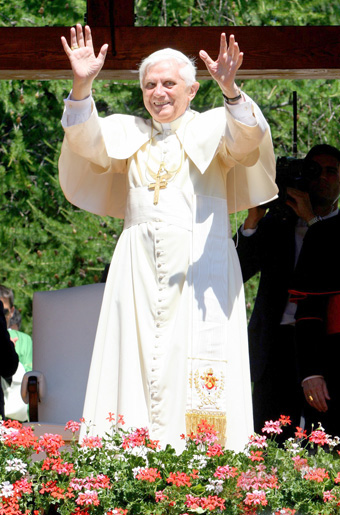
I've got the whole world in my hands!
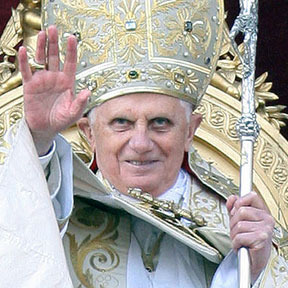
Sieg Heil!
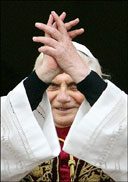
Here is the church; here is the steeple; look inside; see all the defenseless
little people!
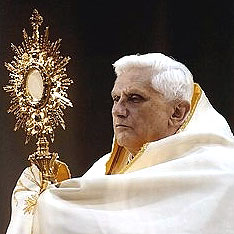
Who cares how many children are starving all over the world, as long as I can
sit on a throne and have billions of dollars in bling?
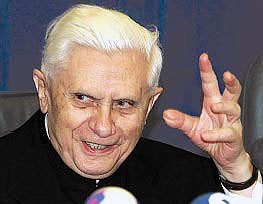
I'll put a spell on you! Show me the money!
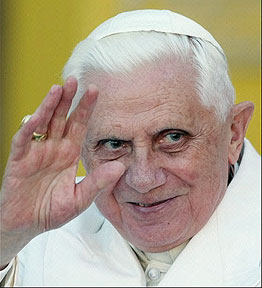
Look deep into my eyes; now show me the money!

I'm King of the World! Hell, I have Christ on my Scepter!
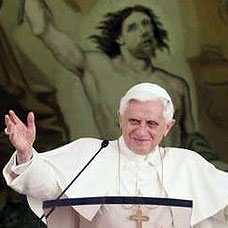
Look who's got my back!
Okay, the pictures are creepy. But what about the evidence? It's even creepier . . .
First, we have a pope who told Africans the use of condoms "increases" the problems posed by AIDS. How can a man with so much influence
speak so rashly and unwisely? A spokesman for the French Foreign Ministry responded,
"these statements endanger public health policies and the
imperative to protect human life." In less diplomatic terms, what
Ratzinger/Benedict said constitutes a death sentence to
people foolish enough to heed him. According to Ratzinger/Benedict, the only
"sure" way to stop the spread of HIV and AIDS is "chastity" and marital
"fidelity." But of course wives can't always depend on their husbands to be
faithful. So if Catholic wives obey the Vicar of Christ, they may well end up
dead. Is this wisdom, or folly? (The question is rhetorical.)
Sarah Palin
is another advocate of chastity. We all know how well that worked for her own
family, don't we? Religious "experts" like Palin and Ratzinger/Benedict live in
a la-la land where "morals" and religious edicts that don't work are more important than
human lives and suffering. In other words, they're dangerous idiots. (When the
pope's words provoked public outrage, the
director of the Vatican press office, Father Federico Lombardi, clarified the Catholic Church's
position, saying it advocates "first, education in personal responsibility in the use of sexuality and
with reaffirmation of the essential role of marriage and the family; second,
with research and implementation of effective treatment of AIDS and making it
available to the greatest number of sick people through many health initiatives
and institutions; third, with human and spiritual assistance for those with AIDS
as for all the suffering, who have always been in the heart of the church." So
the Church seems to be saying that if people don't have sex the way the Church
prefers, rather than using preventive methods, they should seek cures and
plan on suffering. Could anything be more idiotic and dangerous, when a deadly
disease like AIDS can be avoided in most cases via the use of inexpensive
condoms?)
Second, we have a pope who opposes contraceptives, abortion and euthanasia.
It seems he wants human beings to suffer as much as possible, for as long as
possible. According to the "wisdom" of the so-called "Holy Father," we should
only have sex for purposes of procreation, continue to overpopulate the world,
and not allow people who are terminally ill and suffering terribly to end their own
lives on their own terms. Is he the Vicar of Christ, or so out of touch with
reality that no one can take him seriously? (Again, the question is rhetorical.
This is not "wisdom" but madness.)
Obviously most modern human beings have sex primarily for pleasure and only rarely for
purposes of procreation. How can a septuagenarian virgin consider himself
qualified to dispense advice on sex, reproduction and family life to people who
live in the real world, not la-la land? If we have every child that we are
physically capable of bringing into the world, now that we have vanquished the predators
that once helped keep our numbers in check, there won't be a world fit for any
living creature to occupy, in the near future.
Third, we have the all-too-obvious problem with Ratzinger/Benedict's personal involvement in
shocking
cover-ups of pedophilia within the Roman Catholic Church. The evidence is both damning
and overwhelming, as we shall see, shortly. The biggest cover-up, and by far the
most damning and impossible to deny or escape, is the obvious failure of
Catholic bishops, following Ratzinger's lead and example, to report cases of
child abuse to the proper authorities. But even this is only the tip of the
proverbial iceberg, because for almost 2,000 years the Catholic Church has been
damning all the earth's children to an "eternal hell" that was never mentioned
by the God of the Old Testament, or the Hebrew prophets, or the great preachers
of early Christianity: Peter, Stephen, Philip and Paul. How can there be an
"eternal hell" if a place called "hell" was unknown to Adam, Eve, Cain,
Noah, Abraham, Lot, Moses, King David, Solomon, the Hebrew prophets, Peter,
Stephen, Philip and Paul?
Obviously, "hell" was a very late, very clumsy addition to the Bible. Anyone can
use an online Bible search tool like the one at
www.crosswalk.com to verify my claims.
Just search a modern version of the Bible for "hell." A good version to use is
the Holman Christian Standard Bible (HCSB), which was sponsored by the famously
conservative and literal Southern Baptist Convention. According to the HCSB, the
word "hell" does not appear anywhere in the Old Testament, or in any of the
epistles of Paul, or in the book of Acts (ostensibly the self-recorded history
of the early Christian church). Even conservative Bible scholars now freely
admit that the Hebrew word Sheol and the Greek word Hades do not mean "hell" but
"the grave." Everyone went to Sheol-Hades, not just the "wicked." King David
said that if he made his bed in Sheol, God would be there, so he was obviously
not discussing the Christian hell. Job asked to be hidden from suffering in
Sheol, so he was obviously not discussing a place of eternal torment. The sons
of Korah said God would redeem them from Sheol, so they were obviously not discussing a
place that could not be escaped. Ezekiel and Paul agreed that all Israel would
be saved, but Israel (Jacob) himself calmly discussed being reunited with his son Joseph
in Sheol. How can all Israel be saved if Israel himself is in hell?
It is more than obvious that Sheol was not "hell." Anyone who studies Greek
mythology (or just reads the Wikipedia page) can easily see that Hades was not
"hell" either. The Greek hell was Tartarus, not Hades. Tartarus is mentioned in
only one verse in the entire Bible, and that verse discusses fallen angels
awaiting judgment in Tartarus. So according to the Bible, hell is not for human
beings, and it is not eternal.
The only word still translated as "hell" in the HCSB is Gehenna, which appears
in only ten verses in the New Testament. But Gehenna is a physical location in
Israel, and today Gehenna is a lovely park. You can find pictures of it on the
Internet.
So the Catholic Church faces a much bigger problem than the current outrage over
pedophilia and subsequent cover-ups. The single biggest question facing Pope
Benedict is the Bible. If God, the prophets and the great preachers of early
Christianity never discussed a place called "hell," why does the Catholic Church
continue to pretend that it holds the key to "salvation"? And if the Catholic
Church really does hold the key to salvation, how can it be that after 2,000
years it still doesn't know whether a baby who dies without being splashed with
magical water by an even-more-magical priest will go to heaven, hell, purgatory
or limbo? Did God place salvation in the hands of the Catholic Church, yet
completely
forget to explain the most basic things about the process, or did the Catholic
Church make the whole "hell" thing up? (Once again, the question is rhetorical.)
The current problem with pedophilia does create a new theological conundrum: if
someone confesses to an unrepentant pedophile, does it count?
God only knows. But according to the Bible, there is no "hell" and thus nothing
to be "saved" from, after death. The Hebrew prophets spoke of even Sodom being
restored, of the lion lying down with the lamb, and of a heaven without hell. If
they were right, God was to accomplish the miracle without the faith or works of
man. (Or, more correctly, despite the faith and works of man.) If the
prophets
were correct, salvation is entirely the work of God. If they were wrong, the
entire Bible is a hoax because it continually claims there is a God who is able to save.
If God is unable to save, how can he be God?
The Hebrew prophets spoke of the need for chesed (mercy, compassion,
lovingkindness) and social justice in this life, for obvious reasons.
But it seems the Catholic Church has thrown compassion and justice out the
window, where children are concerned. First, it condemns them to "hell" for the
"sin" of being born human. Then it purports to hold the key to
"salvation" without being able to explain clearly what happens to innocent
babies if they die unbaptized. Then if they live and are molested or raped by employees of
the Church, it attempts to defend the criminals at the expense of the victims.
And the ringleader seems to be Ratzinger/Benedict, as we shall now see. I will
say there seems to be some evidence that Ratzinger/Benedict took certain steps,
albeit at a very late date, to combat pedophilia within the Catholic Church,
once he realized the scale of the problem. But what about all the cases that
went unreported to the police for decades, perhaps centuries, as higher-ups in
the Church chose to coddle the perpetrators, cover up their crimes, and shuffle
them around from parish to parish, giving them the opportunity to molest and
rape more innocent victims? How can anyone take a church seriously, that
commands its members to confess and repent, yet refuses to do so itself?
As the German publication Spiegel recently reported: "prosecutors remained relatively powerless
to counter the church's leniency—mainly because they know nothing about the
offenses committed. When there is no plaintiff, there is no judge. As long as
church officials do not file official complaints and succeed in persuading the
victims' families not to report offenses to the authorities, then the Catholic
Church can continue to act within its own realm, and beyond the reach of secular
laws. Up until now, nobody from the outside world has been able to do anything
about it." The Church's biggest sin is not what it did, but what it didn't do.
It didn't report absolutely heinous crimes, the molestation and rape of
children, to the proper authorities.
There are signs the Catholic Church may now understand that change is
imperative. According to Spiegel: "Finally, after much too much hesitation, there is now movement
in the church ... For the first time since the sex
scandal erupted, church officials have indicated that they intend to tackle the
problem seriously. In Bavaria, the Catholic Church now intends to report all
such cases immediately to the authorities. 'We all have to deal with the
consequences of utter evil in the world and in the Church,' says the current
archbishop of Munich, Reinhard Marx. 'This boil must be lanced. Everything must
come out,' his colleague in Bamberg, Ludwig Schick, adds. And the Bishop of
Trier, Stephan Ackermann, who has been engaged by the Bishops' Conference to
handle abuse cases, openly criticizes the institutions of the Church, admitting
that 'there have been cover-ups in a wide range of cases.'" It is good that
Catholic bishops finally admit there have been cover-ups, and understand that
the proper authorities must be contracted when child abuse is suspected, but why
did it take experts on morality centuries to figure this out? And is the
Catholic Church willing to admit that it doesn't have the "absolute truth" on
contraception, abortion, euthanasia, homosexuality, "salvation" and a bizarre
place called "hell," which the God of the Old Testament, the Hebrew prophets and
the great preachers of early Christianity seemed to know nothing about? What,
exactly, has the Catholic Church been peddling for the last two millennia? Child
abuse aside, how many innocent children have been traumatized with visions of
hell, so that Catholic popes, cardinals, bishops and priests can enjoy all the
privileges and perks afforded them by the laity?
Is it possible that a far larger scandal looms ahead, not only for the Catholic
Church, but for every church whose leading lights have told innocent children
that "hell" awaits them, unless they toe religion's absurd lines? Will parents
ever choose to defend their children from the money- and power-hungry ogres of
organized religion? But for now, let's concentrate on the matter immediately at
hand . . .
***
First, to help put things in perspective, here is an article by Terry Sanderson
which delves into a number of the cover-ups orchestrated by
leading figures of the Roman Catholic Church. My comments appear in square brackets:
People are watching the unfolding Catholic abuse scandal with bewilderment—confused as to how priests who committed the most barbaric and depraved acts
against children, often on a huge scale, were just permitted to walk away
unpunished. They want to know how top Vatican officials can simply remain silent
in the face of accusations about conduct that would get anyone else jailed.
[How is it that pedophiles who have molested up to 200 children were not only
allowed to walk around as free men, but were on the payroll of the Catholic
Church and continued to wear priestly vestments, which gave them considerable
authority over children?]
The latest and most damning evidence of the Pope’s personal involvement in
cover-ups comes from the New York Times, which has
uncovered documents that show that when the present Pope was plain old Cardinal
Ratzinger, Inquisitor-in-Chief at the Vatican, he was repeatedly made aware of
the activities of an horrendous serial abuser, Father Lawrence C. Murphy of
Wisconsin, and did nothing to stop him.
[The high office Ratzinger occupied
before he became Pope was actually the re-named, euphemized position of the Grand
Inquisitor!]
Murphy is said to have abused over 200 boys at a school for the deaf. Appeals for help to the Vatican from the
bishop involved were ignored by Ratzinger.
[From all the research I've
done, I'm not sure "ignored" is the right word. Rather, it seems Ratzinger, with
the blessing of John Paul II, assumed authority over all cases pertaining to
pedophilia and what the Catholic Church calls "criminal solicitation" of sex by
priests. But after Ratzinger assumed authority, it seems he consistently failed
to make decisions in a timely manner. Why, it is difficult to say. Some people
with inside information seem to believe there were so many cases, it was taking
up to 18 months for Ratzinger's office to respond to reports of abuses by
priests. Other
people have speculated that there was some sort of paralysis, "disconnect" or
"unholy alliance" involved. I don't pretend to know the reasons for the delays.
But obviously the local police should have been contacted immediately,
and the victims' parents, regardless of who in the Catholic Church was doing
what. In the final analysis, it seems that Ratzinger (the son of a Bavarian
policeman!) and his cohorts acted
criminally themselves, because they failed to report child abuse to the proper authorities
right away. How could an institution that claims to be the ultimate authority on
morality not "know" what to do, when there was only one rational choice?
If the Pope is an obstructer of justice, and an aider and abettor of serial
pedophiles, how can he claim to be an authority on morality?]
And yet still the world seems incapable of holding any of these people to
account. The Vatican has wrapped itself in a cloak of unaccountability that
permits it to shield those responsible—like Cardinal Bernard Law of Boston,
who is wanted by the authorities for questioning on matters related to the cover
up of child abuse. He now resides in the Vatican, having been given sanctuary
and a top job there by the former Pope and enjoys the patronage of the current
Pope, having been asked by him to conduct a funeral mass for the former Pope
[i.e., John Paul II].
[Bernard Law was accused of covering up the facts
about the molestation of thousands of children in the Boston area. When these
facts came to light it was the beginning of the end (hopefully) of the days when
Roman Catholic priests could molest and rape children with virtual impunity.
Under Law's helm, the
Archdiocese of Boston lost millions of dollars in lawsuits and settlements, and
had to close 65 parishes. Law finally resigned as Archbishop of Boston, but
remained a Cardinal in the employ of the Catholic Church and moved to Rome.
According to the Boston Globe, "Three decades of previously secret
correspondence between defrocked priest John J. Geoghan and the two cardinals he
served—Humberto S. Medeiros and Bernard F.
Law—make it clear that Geoghan was treated with unfailing delicacy by his
superiors, whose letters portray him as dogged by unpleasant circumstances
beyond his control. So kindly and solicitous were Law's letters that when
Geoghan twice asked Law to appoint him pastor of St. Julia Parish in Weston—the same parish where he had previously been forced to go on sick leave after
new molestation complaints surfaced—Law twice told Geoghan he would consider
the request and forward his name to personnel officials."]
How was Cardinal Cormac Murphy O’Connor, the former head of the Catholic Church
in England and Wales permitted to walk away from his own cover-up scandal
involving the vile activities of Father Michael Hill, who violated numerous
children, and was moved from diocese to diocese by the Church so that his evil
activities could continue? Newspaper investigations into that case were
peremptorily halted when the Church accused the media of “persecuting” the
Cardinal. Why didn’t the police take up the investigation? Why wasn’t Murphy
O’Connor ever made to answer?
[O'Connor did not report the actions of Hill, who was later convicted of
raping twelve boys, to the police. In an interview with The Daily Telegraph,
O'Connor said that he would have acted differently if Catholic Church guidelines
had been written differently. This illustrates two deep-seated problems in the
Catholic Church: (1) the higher-ups in the Church seem to think the Church is
both above the law and a law unto itself, and (2) with such a strange prevailing
mindset the Church should provide its employees with simple, direct
instructions: "If a crime has been committed, or may have been committed, report
it to the police immediately." But it is hard to fathom how Cardinals and
Archbishops who are supposedly experts on morality seem to be clueless when it
comes to the rights of children not to be exposed to known pedophiles.]
And it seems still those who wish to make the Vatican listen are treated as the
enemy. On Thursday, members of the Survivors Network of those Abused by Priests
(SNAP),
an American advocacy group, held an impromptu news conference in St. Peter’s
Square, holding up pictures of Father Murphy and calling on the Vatican to take
responsibility.
“They’re not holding themselves accountable, and these documents show they were
very involved in the case,” said John Pilmaier, the group’s Wisconsin director.
Twenty minutes into the news conference, the Rome police told the group that it
did not have a proper permit, and brought organizers in for questioning. They
were detained for two and a half hours. “We’ve spent more time in police custody
than most of these pedophile priests have,” Mr. Pilmaier said.
[Catholic priests have been treated with "unfailing delicacy" while
children have been seriously harmed because acts of serial molestation and rape
were not reported to the proper authorities, so why are the church's critics
being vilified? Of course people who make mistakes that harm children should be
criticized. Clearly, the Catholic Church needs to do one of two things: prove
that it reported cases of child abuse to the proper authorities as soon as it
knew about them, or do what it advises more than a billion of its followers to
do: confess its mistakes and repent (i.e., change its ways).]
Now the Vatican is trying to protect itself with its age-old trick of blaming
the messenger. After the New York Times published its evidence, a
senior Vatican official said there was a concerted campaign to damage the
Catholic Church and its supreme leader. “It’s obvious the New York Times has
its mind made up. You have to ask why they didn’t print a story earlier this
month on the conviction of a Jewish rabbi in Brooklyn on eight counts of sex
abuse.” The official also referred to a libel case against Oprah Winfrey that
involved sex abuse allegations that was settled quietly on Wednesday. “But then
why the Front Page for this story? They are targeting the Pope. There’s a blood
lust for attacking the Catholic Church. We have to look at these cases one by
one. There is plenty of embarrassment to go around: district attorneys, school
teachers—take your pick.”
But the Catholic Church, unlike all these others, seeks to tell us relentlessly
that it is the ultimate moral authority, that it cannot be wrong on matters
ethical, and that all other codes are inauthentic or wrong. Yet, as our
Executive Director repeated last week at the UN, the Vatican is in breach of the Convention on the Rights of
the Child. These are the reasons why it deserves special treatment and special
attention. And why its sins—which it so readily condemns so readily in others—are magnified by its own claims to the moral high ground. And despite all this, we still have our Prime Minister saying that the Pope is
welcome here and that his visit will represent a “joyous” event for the country. But it will not be joyous for the thousands of people whose lives have been
deeply scarred by the activities of priests who this Pope, directly or
indirectly, has helped to escape justice. It will feel more like a kick in the
teeth to them.
I believe Sanderson is right. The Catholic Church claims the Pope is able
to speak "infallibly." It claims to be able to guide human beings to
salvation and wisdom. But its leading lights don't seem to understand that
children must be protected from adults who prey on them. Its Pope, Cardinals and
Bishops don't seem to know that crimes must be reported to the police. So the
Church seems like a sad, strange, medieval institution unable to fathom a modern
world where individuals are no longer considered chips in a game of world
domination. Today parents are far more concerned about the welfare of their
children than about the authority and dignity of the Pope and his cohorts. But
it seems the Pope and the Catholic Church just don't get it. To them, a child is
a pawn and a priest is a far more valuable playing piece. But what happens when
the priest turns out to be a Rook?
***
Ratzinger/Benedict was the "top dog" in the Catholic Church in matters
of pedophilia. But how did he use his authority? Did he act responsibly? It
seems not. Take, for instance, the matter of Father Lawrence Murphy, a
Catholic priest accused of molesting around 200 deaf boys, some of them in the
confessional.
Two Wisconsin bishops urged the Congregation for the Doctrine of the Faith (the
Vatican office led by Cardinal Joseph Ratzinger) to allow them to conduct a
church trial against Murphy, but church and Vatican documents reveal that the
Vatican ordered the process halted. Despite the "grave allegations," Ratzinger's
office ruled that Murphy should instead "repent" and be "restricted from
celebrating Mass outside his diocese."
This story was reported by the New York Times, "adding fuel to an
already swirling scandal about the way the Vatican in general, and Benedict in
particular, have handled reports of priests raping children over the years."
The Times obtained the Murphy documents from Jeff Anderson and Mike
Finnegan, attorneys for five men who sued the Milwaukee archdiocese.
"The goal of Cardinal Ratzinger, now Pope Benedict, was to keep this secret,"
said Peter Isely, the Milwaukee-based director of SNAP, the Survivors Network of
Those Abused by Priests. "This is the most incontrovertible case of pedophilia
you could get. We need to know why he (the pope) did not let us know about him
(Murphy) and why he didn't let the police know about him and why he did not
condemn him and why he did not take his collar away from him."
Church and Vatican documents obtained by two lawyers who filed lawsuits against
the Archdiocese of Milwaukee are "remarkable in the repeated desire to keep the
case secret," but they do "suggest an increasingly determined effort by bishops
to heed the despair of the deaf community in bringing a canonical trial against
Murphy." Unfortunately, Ratzinger's office seemed to have little or no
interest in justice for the victims, or protecting possible future victims from
similar fates.
Ratzinger's deputy, Cardinal Tarcisio Bertone, "shut the process down after
Murphy wrote him a letter saying he had repented, was old and ailing, and that
the case's statute of limitations had run out."
In July 1996, Milwaukee Archbishop Rembert G. Weakland sent a letter
seeking advice on how to proceed to Ratzinger.
Weakland received no response from Ratzinger, and in October 1996 convened a
church tribunal to hear the case. In March 1997,
Weakland wrote to the Vatican's Apostolic Signatura (the Vatican high court),
asking its advice. A few weeks later, Bertone (at that time the
Vatican's Secretary of State) told the diocese bishops to begin "secret
disciplinary proceedings" against Murphy according to 1962 norms concerning
soliciting sex in the confessional. (These "norms" include invoking the
"pontifical secret" with the threat of excommunication if anyone
involved were to speak publicly.)
But a year later, Bertone reversed himself, advising the diocese to stop the
process after Murphy wrote to Ratzinger personally, saying he had "repented."
Bertone suggested that Murphy should instead be subject to "pastoral measures
destined to obtain the reparation of scandal and the restoration of justice."
The archbishop handling the case, Bishop Raphael Fliss, objected, saying
in a letter to Bertone that "I have come to the conclusion that scandal cannot
be sufficiently repaired, nor justice sufficiently restored, without a judicial
trial against Fr. Murphy." Fliss and Weakland then
met with Bertone in Rome in May 1988. Weakland informed Bertone that Murphy "had
no sense of remorse and didn't seem to realize the gravity of what he had done,"
according to a Vatican summary of the meeting. But
Bertone insisted that there weren't "sufficient elements to institute a
canonical process" against Murphy because so much time had already passed.
Instead, he said, Murphy must be forbidden from celebrating Mass publicly
outside his home diocese. Weakland, likening Murphy
to a "difficult" child, then reminded Bertone that three psychologists had
determined he was a "typical" pedophile, in that he felt himself a victim.
But Bertone merely suggested Murphy take a "spiritual retreat" to determine if he was
"truly sorry," or otherwise face "possible defrocking."
"Before the meeting ended, Monsignor Weakland reaffirmed the "difficulty he will
have to make the deaf community understand the lightness of these provisions,"
the summary noted."
After Murphy was removed from the school in 1974, he went to northern Wisconsin,
where he spent the rest of his life working in parishes, schools and, according
to one lawsuit, a juvenile detention center.
Weakland resigned as archbishop in 2002 after admitting the archdiocese secretly
paid $450,000 to a man who accused him of sexual abuse.
Catholic Canon 1387 stipulates that a priest who "in confession, or on the
occasion or under the pretext of confession, solicits a penitent to commit a sin
against the sixth commandment of the Decalogue, is to be punished, according to
the gravity of the offence, with suspension, prohibitions and deprivations; in
the more serious cases he is to be dismissed from the clerical state." But
Ratzinger seldom acted to defrock a priest, and when he did, it took him
extraordinary lengths of time to act. In the meantime pedophiles were not only
free to molest more innocent victims, but they were still being subsidized by
salaries paid by the church, and were still allowed to wear the vestments of
priests.
In 1962 Emmett McGloughlin wrote prophetically that "The sexual affairs of
priests in the U.S. are more closely guarded secrets than the classified details
of our national defense." The same year, on March 16, Cardinal Alberto
Ottaviani, the head of the Holy Office, presented Pope John XXIII with
Crimen sollicitationis (Instruction on the Manner of Proceeding in Cases of
Solicitation). This "highly secret" (at least at the time) document contains
instructions for bishops on how to proceed in trying cases of sexual abuse and
homosexuality among clerics. The letter can now be read at this link:
http://rcf.org/pdfs/Criminales.pdf
***
Did Ratzinger himself "put a lid" on proceedings against other powerful
Catholics? According to alleged victims of pedophilia, he did. For example, here's
the report of Brian Ross of ABC News, whose hand was slapped away by Pope
Benedict (then Cardinal Ratzinger) when he attempted to discuss the case below:
Priestly Sin, Cover-Up
Powerful Cardinal in Vatican
Accused of Sexual Abuse Cover-Up
By Brian Ross
ABC News
A trusted ally of Pope John Paul II has been accused of
sexually abusing boys a half-century ago at an elite seminary for the Catholic
Church.
The alleged victims say the Vatican knew of the allegations
against Father Marcial Maciel and chose not to pursue them.
In fact, the pope has continued to praise 82-year-old Maciel,
a Mexico native, as an effective leader of Catholic youth, despite detailed
allegations sent to the Vatican four years ago saying the man was also a
long-time pedophile.
Maciel denies the charges and said the men made them up only
after leaving the Legion of Christ.
Maciel is the founder of the little-known but well-connected
and well-financed Legion of Christ which has raised millions of dollars for the
Church. Operating in the United States and 19 other countries, the Legion of
Christ recruits boys as young as 10 years old to leave their families and follow
a rigorous course of study to become priests.
"I think Father Maciel is one of the most powerful men in the Catholic
Church today and also arguably the most mysterious," said Jason Berry, author of
Lead Us Not Into Temptation: Catholic Priests and the Sexual Abuse of
Children.
Hidden Abuse, 50 Years Ago
Maciel is alleged to have molested some of the young men under
his control, some 50 years ago, at the well-manicured seminary and headquarters
of the Legion of Christ, a few miles from the Vatican. It is hidden behind high
walls and a steel gate that warns of a watch dog inside.
"He pushed my hand onto his penis. And I didn't know anything
about masturbation," Juan Vaca, who was first abused when he was 11 years old,
told ABCNEWS. "And he says, 'You don't know how to do it. Let me show you.' And
he gets my penis himself and starts to masturbate me. I was in shock."
Now 65 years old and a psychology professor at Mercy College
in Dobbs Ferry, N.Y., Vaca, the former superior of the Legion of Christ in
Orange, Conn., says he was one of some 30 boys abused by Maciel during his
studies at the Legion in Rome.
Vaca also told ABCNEWS how he was instructed to bring other
boys from their bedrooms to Maciel's room. Vaca said Maciel had different boys
visit his rooms on different nights. "In some instances, two were together with
him—myself and another one," he said.
Vaca said Maciel rewarded him with special privileges, such as
a private meeting with Pope Pius XII, who served as pope from 1939 to 1958.
Maciel always assured Vaca he was doing nothing wrong. When Vaca admitted
concerns of committing a sin, Vaca said Maciel absolved him from his sin "in the
name of the Father and of the Son and of the Holy Spirit."
He told him not to worry and to forget about it. But Vaca said
he could not forget.
Eight Men's Allegations Went Unanswered
Vaca is not alone. He is one of eight former students, now all
in their 60s, who have signed sworn affidavits submitted to the Vatican that
they were abused by Maciel.
When they were members of the Legion, the accusers were devout
followers of Maciel. But for the last eight years, they have been trying to get
the Vatican to listen or even acknowledge their detailed allegations of sexual
abuse at the hands of Father Maciel. They say they have not heard a response
from the Vatican.
In 1997, they went public, telling their story to The Hartford
Courant, a newspaper in Connecticut.
Courant reporters Jerry Renner and Jason Berry, who wrote the
story, repeated the allegations to the Vatican, yet received no response from
the Vatican. However, later that year, the pope took a step that surprised them.
Maciel was appointed to represent the pope at a meeting of
Latin American bishops, which Renner and Berry took as a clear signal the
Vatican had ignored the allegations.
"He's Untouchable"
"I would say he has the pope eating out of his hand. Who is
going to touch him no matter what he does?" said J. Paul Lennon, a member of the
Legion of Christ for 23 years, who has since left and has been helping those
claiming to be victims. "He's untouchable."
Lennon said Maciel is a master of Vatican politics: "He's
worked with several popes, knows the inner workings, knows monsignors, knows
cardinals, knows maybe the men who are really in power, knows that so well, so
well."
Then, four years ago, some of the men tried a last ditch
effort, taking the unusual step of filing a lawsuit in the Vatican's secretive
court, seeking Maciel's excommunication.
Once again they laid out their evidence, but it was another
futile effort—an effort the men say was blocked by one of the most powerful
cardinals in the Vatican.
The accusers say Vatican-based Cardinal Joseph Ratzinger, who
heads the Vatican office to safeguard the faith and the morals of the church,
quietly made the lawsuit go away and shelved it. There was no investigation and
the accusers weren't asked a single question or asked for a statement.
He was appointed by the pope to investigate the entire sex
abuse scandal in the church in recent days. But when approached by ABCNEWS in
Rome last week with questions of allegations against Maciel, Ratzinger became
visibly upset and actually slapped this reporter's hand.
"Come to me when the moment is given," Ratzinger told ABCNEWS,
"not yet."
"Cardinal Ratzinger is sheltering Maciel, protecting him,"
said Berry, who expressed concerns that no response was being given to the
allegations against the man charged with sex abuse. "These men knelt and kissed
the ring of Cardinal Ratzinger when they filed the case in Rome. And a
year-and-a-half later, he takes those accusations and aborts them, just stuffs
them."
Maciel Denies Allegations
As for Father Maciel, he would not agree to speak with ABCNEWS this week in
Rome, although he issued an emphatic, written denial of the allegations, in
which he strongly denied the allegations of what he called "repulsive behavior."
He said the men made up these allegations only after leaving the Legion of
Christ.
"He has many other things to do rather than appear on a news
program," said Father Tom Williams, who said he would serve as Maciel's
spokesman. He called the allegations "patently false."
"I know Father Maciel very well," Williams told ABCNEWS. "I've
lived with him for 10 years." Williams has never asked him about the
allegations, but when the Courant ran the story in 1997, Legion spokesman
released a statement denying the allegations.
Williams said the men making the accusations against Maciel
can't be believed because they didn't raise the sexual abuse charges in the
1950s when Vatican investigators were looking into other matters relating to
Maciel. According to Williams, the Vatican investigated Maciel on counts of
mismanagement of funds, drug and substance abuse and drug trafficking. The
Vatican pronounced Maciel innocent of those charges and reinstated him as
superior general to the Legion.
In addition, Williams noted, a ninth accuser retracted similar
allegations, claiming he was pressured to lie by the other eight accusers. Those
men stand by their story, now an open challenge to both the pope and Ratzinger,
who just this week proclaimed there is no place for pedophiles in the church
during the Vatican meetings with American cardinals.
"It does not inspire much faith," said Berry.***
According to this follow-up article, published on April Fools Day, Ratzinger may
have taken revenge (albeit a rather mild revenge) on Father Maciel, once he was
no longer under the protection of Pope John Paul II. If so, it's a shame that in
the Catholic Church politics, money and power seem to trump compassion and
justice for the victims of child abuse.
New Questions About Pope Benedict's Role In Sex Scandal
By Brian Ross and Anna Schecter
ABC News
April 1, 2010
UNITED STATES -- Investigative Reporter Says Top Vatican
Official Pushed Cardinal Ratzinger Not to Investigate Legion of Christ Founder
Father Maciel; Ratzinger Punished Maciel After Becoming Pope
With growing questions about the role of Pope Benedict in the
Catholic church's sex scandal, there is renewed attention to the Pope's
handling, while still Cardinal Joseph Ratzinger, of a case involving a pedophile
priest who had powerful connections inside the Vatican.
With growing
questions about the role of Pope Benedict in the Catholic church's sex scandal,
there is renewed attention to the Pope's handling, while still Cardinal Joseph
Ratzinger, of a case involving a pedophile priest who had powerful connections
inside the Vatican.
Now investigative journalist Jason Berry says that Cardinal
Ratzinger was pressured not to purse allegations of abuse against Father Marcial
Maciel, considered a favorite of Pope John Paul II, because of pressure from
Vatican Secretary of State Cardinal Angelo Sodano. It was only after Ratzinger
became Pope that he forced Maciel into retirement, although he did not strip him
of his priestly powers.
Maciel, who died in 2008, was the founder of the powerful
worldwide Catholic order known as the Legion of Christ. "Father Maciel was a
revered figure in the Vatican," said Berry. "I think that Father Maciel used
money the way some politicians do, in spreading it liberally to buy support,
both for himself and his religious order."
Berry says that Maciel was known as a man who spread around
generous gifts and cash to top people in the Vatican.
In a statement issued just last week, the Legion of Christ
admitted that Maciel had abused seminarians. Last year, the order issued a
statement admitting that its founder had fathered at least one child.
But when former Legion members brought allegations to the
Vatican in 1998 that they had been abused as teen seminarians by Father Maciel,
nothing happened for six full years.
Juan Vaca, now a college professor in his seventies in New
York, said he was molested by Maciel.
"He pushed my hands into his penis," said Vaca. "And I didn't
know anything about masturbation. And he said, 'You don't know how to do it. Let
me show you.'"
Vaca was one of eight men who sent sworn affidavits to the
Vatican in 1998 alleging that they had been molested by Maciel. The Vatican's
response, said Vaca, was "Absolutely nothing, not a word."
The Vatican official in charge of the investigation was
then-Cardinal Joseph Ratzinger, now Pope Benedict.
Cardinal Ratzinger became upset when I tried to ask him about
the delay in the Maciel case in 2002. "You do not come to me," he said, and
slapped my hand away.
Berry now says Ratzinger was pressured to halt the case by a
well-placed Maciel ally, Vatican secretary of state Cardinal Angelo Sodano.
"And Ratzinger basically got the message do not go after this
man," said Berry.
Berry says Ratzinger finally decided to go ahead with an
investigation on his own in 2004, after Maciel continued to be seen in public
with Pope John Paul II, despite the allegations.
Said Berry, "I think at that point Ratzinger figured he had to
do something on his own. And so he broke ranks with Sodano, broke ranks with the
Pope, and ordered an investigation of Maciel."
Shortly after Cardinal Ratzinger became Pope Benedict, he
forced Maciel into retirement, although he did not defrock him, meaning strip
him of his priestly powers.
Maciel died in 2008, still a priest. Vatican officials say the
Pope will soon decide whether to take further action against the order he
founded and led for more than 60 years, the Legion of Christ.
Berry's documentary film "Vows of Silence" about the Maciel
scandal and the Legion of Christ will air on Irish television next month.
While I am not a fan of Ratzinger/Benedict, by any stretch of the
imagination, as I have studied these matters, I have come to the conclusion that
he may have decided (perhaps sometime after he began to read multitudes of case
histories himself) that the Catholic Church needed to change course. But until
he became Pope he may have been stymied by various powers within the Church. And
he may have been influenced by his personal likes and dislikes for certain
people around him. That would make him very human, but according to the Catholic
Church he is capable of speaking "infallibly" and that assertion sticks in my
craw. Why doesn't he use his magical powers to speak infallibly on the matter of
pedophilia? And while it seems he probably did try to set certain things right,
it doesn't seem to me that he came close to going far enough, and that the
actions he did take were "too little, too late."
***
Here is a series of letters published online by the New York Times.
What is most shocking about this case, to me, is that the priest in question
pled "no contest" to multiple cases of sexual abuse of minors, was convicted and
sentenced to six years of prison time (suspended) and probation, then actually
petitioned the Vatican to be released from the priesthood. But it still
took a decade from the time of his arrest in 1978, until he was finally
defrocked in 1987. If it takes ten years to defrock a priest who petitions the
church to be released from his vows, no wonder there is such a problem with
priests who deliberately use the Church to prey on children. You can find the
New York Times document trail at the following link:
http://documents.nytimes.com/the-document-trail-stephen-kiesle
Here are capsules of the letters, which tell a clear but sordid tale:
April 25, 1981: The Rev. Louis Dabovich, the pastor of a parish where Stephen
Kiesle had worked as a deacon and youth minister, writes Franjo Seper, Cardinal
Prefect of the Congregation of the Doctrine of the Faith, supporting Kiesle's
petition to leave the priesthood. Dabovich mentions Kiesle's "immaturity" and
"lack of responsibility." In the letter published by the New York Times, the
word "lack" seems to be misspelled "lact." Dabovich also mentions that Kiesle
had a domineering mother and that he believed Kiesle's commitment was not to
"the LORD" but to his mother. He also mentions certain "improprieties" related
to children that, according to him, he only learned about later. Cardinal Joseph
Ratzinger replaced Cardinal Seper in February 1982, meaning he inherited the
case. (First letter, page 1)
May 8, 1981: Father Kiesle's pastor, The Rev. George E. Crespin, writes to
Cardinal Seper about Kiesle's case. He too supports Kiesle's petition. According
to Crespin, Kiesle was "highly disorganized," "irresponsible," "highly
undisciplined" and "unmotivated" to fulfill "large areas of priestly ministry."
Crespin seems to be largely in agreement with Dabovich, other than when he says
Kiesle told him that his family opposed his becoming a priest. Perhaps Kiesle
changed his story over time, or perhaps either Dabovich or Crespin drew
incorrect conclusions about Kiesle's reasons for becoming a priest. Crespin
mentions that Kiesle displayed "arrested emotional development" and "adolescent
behavior" and related to most adults only with "great difficulty," while seeming
to be interested only in working with children. When I read those comments, I
thought of Michael Jackson and his problems adjusting to adult life. Crespin
mentions Kiesle having "questionable relationships with children " and says they
occurred while he was on sabbatical. It seems at least slightly curious that
both Dabovich and Crespin happened to be conveniently out of the picture
whenever Kiesle acted inappropriately, but I suppose anything is possible.
Crespin concludes by saying it would be "unwise" for Kiesle to remain a priest
and that it would not be "prudent" for the Church to "allow him to continue in
the ministry." (Second letter, page 3)
June 19, 1981: Bishop John S. Cummins petitions Pope John Paul II to laicize
(defrock) Stephen Kiesle due to multiple sexual offenses with minors and the
priest's stated desire to leave the ministry. Cummins is obviously quite
familiar with Kiesle's case, mentioning that he had been charged with taking
"sexual liberties" with "at least" six boys, ages eleven to thirteen, and had
pleaded "no contest." According to Cummins, Kiesle was not supposed to be left
alone with juveniles, and yet at some point the Church allowed him to once again
work as a youth minister. Just when that happened, I am not certain, but it's
possible that the Church may have participated in violating the terms of
Kiesle's parole. Cummins closes by saying that Kiesle's decision to leave the
priesthood is "irrevocable." (Third letter, page 5)
Nov. 17, 1981: Response to Bishop Cummins From the Congregation for the Doctrine
of the Faith (in Latin). I don’t read Latin, but from what I have read
elsewhere, this was a request for further documentation. But why would any more
information be required? Kiesle had been convicted of multiple cases of sexual
abuse of minors, and he had asked to be released from his vows voluntarily. If
there was ever and open-and-shut case, surely this was it. (Fourth letter, page
7)
Feb. 1, 1982: Bishop Cummins writes to Cardinal Ratzinger,
supplying additional information about Kiesle's case and telling the cardinal
there would be no scandal if the petition was granted, but that "there might be
greater scandal to the community if Father Kiesle were allowed to return to the
active ministry." Words to the wise, no doubt, but they seemed to fall on deaf
ears. (Fifth letter, page 8)
Sept. 24, 1982: The Rev. George E. Mockel of the Diocese of Oakland asks
Cardinal Ratzinger about the status of Kiesle's petition. (Sixth letter, page 9)
Dec. 20, 1983: Father Mockel writes to Bishop John Cummins
about the Vatican's curt reply to his inquiry, saying that Vatican officials
never respond to "mere priests" and suggesting that he write to Ratzinger
himself. (Sixth letter, page 10)
Jan. 17, 1984: Bishop John Cummins of the Oakland Diocese
writes to Thomas J. Herron (a close friend and colleague of Cardinal
Ratzinger's) to inquire on the status of Father Kiesle's case and that of
another priest. Cummins may have believed Herron capable of expediting his
requests, although that's just an "educated guess" on my part. (Seventh letter,
page 11)
Sept. 13, 1985: Bishop Cummins follows up with Cardinal
Ratzinger on the status of Father Kiesle's case, pointing out that multiple
requests had been made, starting in 1981. He does not mention his own letter to
Herron. (Eight letter, page 12)
Sept. 17, 1985: Father Mockel sends an inter-office memorandum
to Bishop Cummins about the continuing lack of response from Cardinal Ratzinger.
(Ninth letter, page 13)
Sept. 27, 1985: Father Mockel asks the apostolic delegate in Washington, D.C.,
Pio Laghi, to forward a letter to Cardinal Ratzinger regarding Father Kiesle's
laicization case. (Tenth letter, page 14)
Nov. 6, 1985: Cardinal Ratzinger finally responds to the
Oakland Diocese's inquiries about Father Kiesle, in a letter written in Latin.
But he has yet to take any appreciable action. (Eleventh letter, page 15)
Here is an English translation of Ratzinger's letter, dated November 6, 1985
letter, to Oakland Bishop John S. Cummins. It was translated for The Associated
Press by Thomas Habinek, chairman of the University of Southern California
Classics Department:
Most Excellent Bishop,
Having received your letter of September 13 of this year,
regarding the matter of the removal from all priestly burdens pertaining to Rev.
Stephen Miller Kiesle in your diocese, it is my duty to share with you the
following: This court, although it regards the arguments presented in favor of
removal in this case to be of grave significance, nevertheless deems it
necessary to consider the good of the Universal Church together with that of the
petitioner, and it is also unable to make light of the detriment that granting
the dispensation can provoke with the community of Christ's faithful,
particularly regarding the young age of the petitioner. It is necessary for this
Congregation to submit incidents of this sort to very careful consideration,
which necessitates a longer period of time. In the meantime your Excellency must
not fail to provide the petitioner with as much paternal care as possible and in
addition to explain to same the rationale of this court, which is accustomed to
proceed keeping the common good especially before its eyes. Let me take this
occasion to convey sentiments of the highest regard always to you.
Your most Reverend Excellency
Joseph Cardinal Ratzinger
Another person who provided a very similar translation wrote: "When I first read
the letter, it struck me as being so remote and bloodless and unconnected to the
actual case, that I thought 'It can’t be anything but a form letter.'" However,
the letter mentions the youth of Kiesle, and recommends the need for "paternal
care" (i.e., fatherly oversight) so it seems Ratzinger was familiar with the
case: familiar enough to know Kiesle's age and circumstances. He needed to be
watched carefully, and overseen. And, yes, the letter seems cold-blooded because
it ignores the extreme youth of the victims (all thirteen or younger at the time
they were molested), while discussing the "youth" of the petitioner, Kiesle, who
was in his late thirties at the time. As we are about to see, the "longer period
of time" may be taken to imply that Kiesle would not be defrocked until he
reached age forty, due to Church policy.
Dec. 12, 1985: Father Mockel writes to Bishop Cummins, saying that his reading
of Cardinal Ratzinger's reply to Kiesle's case is that "they are going to sit on
it until Steve gets quite a bit older." He would prove to be correct, as Kiesle
was not defrocked until 1987, when he turned forty. (Eleventh letter, page 16)
Jan. 13, 1986: Father Mockel writes to Kiesle, telling him
that the Vatican is concerned that granting his request for laicization could
"provoke some scandal among the faithful." (Twelfth letter, page 17)
May 11, 1988: Maurine Behrend, who seems to be associated with the Oakland
Diocese's Youth Ministries Office, writes a letter expressing her anger and deep
frustration that "a convicted child molester is currently the youth ministry
coordinator at St. Joseph's Parish" in Pinole, California. She says the problem
has been pointed out repeatedly for eight months. She demands what most of the
world is now demanding: that convicted child molesters not be allowed to work
with children. (Thirteenth letter, page 18)
Subsequent timeline:
2002: Kiesle is arrested and charged with 13 counts of child molestation; all
but two are thrown out due to the statute of limitations.
2004: Kiesle pleads no contest to felony charge of molesting a
young girl in 1995 at his Truckee vacation home.
2004: Kiesle is sentenced to six years in prison for the 1995
molestation.
2005: Ratzinger is elected pope and adopts the name Pope
Benedict XVI.
2009: Kiesle is released on parole in March; he violates
parole in October and returns to prison.
2010: Kiesle is released in February. He is a registered sex
offender living in Rossmoor, the gated seniors community in Walnut Creek.
Source: Associated Press
The HyperTexts









